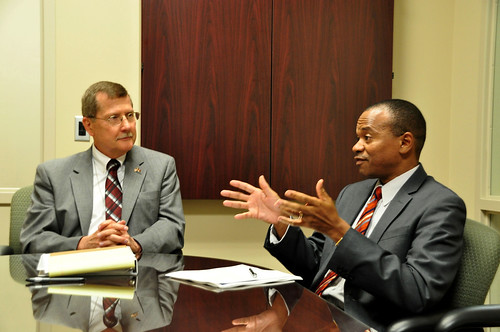
Five areas operate under temporary deans, as long hiring processes pend.
Carol Lang is the interim dean of University Libraries. The position isn’t uncommon, which Lang attributed to the financial crisis that started in 2008.
Temple currently has interim deans in five areas: University Libraries, the College of Education, the School of Communications and Theater, the College of Health Professions and Social Work and Tyler School of Art.
The deans in these schools and departments are members of the Council of Deans, which meets bi-monthly with the provost.
“Ever since the fall of 2008, when the global financial crisis evolved, the university has had hiring freezes in place,” Lang said. “So hiring has been slower, because we’ve had to seek permission at the highest levels to go and fill a position.”
“Every single staff member, because of that, has had to in some cases, learn to do things in new ways,” Lang added.
Provost and Senior Vice President for Academic Affairs Richard Englert said that decreases in state appropriations do not affect the hiring process, but rather the number of appointments made in specific departments.
“I’ve been welcomed, oriented and mentored in the Council,” James Earl Davis, interim dean of the College of Education said. “Do I hold my own in that group? Of course I do.”
When hiring an interim dean for the College of Education, Englert met with the collegiate assembly, made up of all staff and faculty of the affected college.
“I spoke to the faculty, and I said, ‘Look, our dean is going to be leaving, I need to make a decision about how to appoint an interim dean,’” Englert said. “People gave their ideas, both about what are the main things the college will be facing, as well as what kind of person they would like to see in that position. What we went through was a rather thorough data gathering process. I actually sat down with some people who were potential [candidates].”
Englert conferred with the president before he presented the position to Davis.
“My understanding is I was nominated multiple times,” Davis said. “Given the process, some names or folks emerged in the college and my name was one of those.”
Davis said his interim dean status does not change his duties within the College of Education. Like all deans, Davis’ job involves dealing with the budget, academic programming, student support, alumni relations and fundraising.
Even Lang interacts with alumni through the Library External Affairs and Advancement office.
“Unlike a school or college, no one graduates from a library, so the library doesn’t have alums in that sense, but nobody can graduate without a library,” Lang said.
Dr. Thomas L. Jacobson, interim dean of the School of Communications and Theater, said the cuts put pressure on administrators.
“I would say that the university as a whole is upping its game in what you call ‘university advancement’ or ‘development,’ and fundraising and advancement, more generally has been a part of the dean’s job for, you know, years now,” Jacobson said.
Jacobson, as interim dean, has to stay updated in his field, even though he does not publish as much as he did before accepting the position, which was intended to last two years. He has held the job since 2009.
“I read a lot more about theater, and film and advertising, than I would otherwise,” Jacobson said, adding that his background is in the political communications.
“Since coming to this school, and especially since assuming the interim dean position, I spend more time reading broadly on a variety of subjects,” Jacobson added. “I do also attend conferences I wouldn’t otherwise. These are partly to show the flag, and partly for my education.”
Since coming to Temple, Jacobson has taught one graduate course per year.
“If any student wants to talk to me, I love it when anybody wants to talk to me. I do get addressed directly, via email, in a variety of cases. Sometimes it’s students who are having problems,” Jacobson said. “More often than that, it’s students who have gotten a scholarship or something, and they’re writing to say thanks.”
Although Davis continued teaching during his first semester in the job, he has since given up his regular teaching position. He specializes in gender studies and urban education, and still publishes research, though at a slower rate than before becoming interim dean, he said.
Hiring a permanent dean is a different process, Englert said.
The provost, president and the affected college faculty and staff form a search advisory committee. A dean from another school, someone to whom the prospective dean would not ultimately report, usually chairs the committee.
“The culture of the deanship is known by peer deans, so that perspective of someone leading the advisory committee is important,” Davis said.
The search advisory committee members are chosen by the faculty senate, Temple Student Government and the faculty and staff of the affected college or school. At least one of the committee members must be a non-tenured person, Englert said.The provost and the president sit with the search advisory committee, which puts together a “position description.”
The committee, who also sometimes hires an outside consultant, puts out a nation-wide employment announcement. A selection of applicants is invited to an off-campus interview and, from that selection, a final group of applicants are brought to Temple. This final group is publicized.
Hiring an interim dean takes approximately two months, while hiring a permanent dean can take usually between eight and nine months. Interims are typically hired internally, but if the interim dean seeks the permanent position, he or she would follow the same process as first-round applicants.
Amelia Brust can be reached at abrust@temple.edu.



Be the first to comment